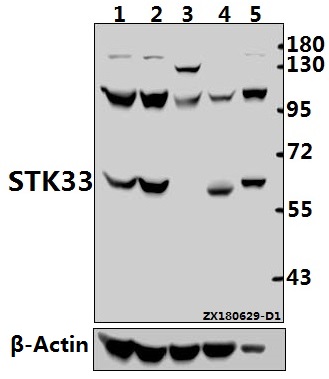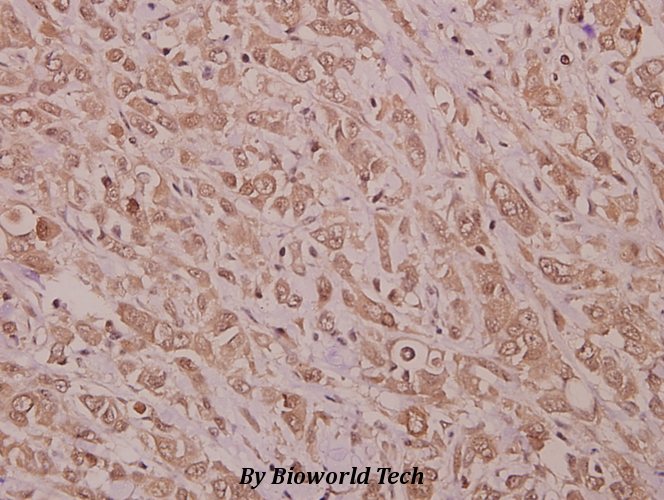Product Name :
STK33 (N108) polyclonal antibody Background :
The phosphorylation and dephosphorylation of proteins on serine and threonine residues is an essential means of regulating a broad range of cellular functions in eukaryotes, including cell division, homeostasis and apoptosis. A group of proteins that are intimately involved in this process are the serine/threonine (Ser/Thr) protein kinases. STK33 (serine/threonine kinase 33) is a 514 amino acid protein that belongs to the CaMK (calcium/calmodulin dependent kinase) subfamily of structurally related serine/threonine kinases. Widely expressed at low levels with predominant expression in testis, lung, retina and fetal organs such as brain, heart and spinal cord, STK33 contains one protein kinase domain and functions as a Ser/Thr protein kinase with a possible role in spermatogenesis. Product :
Rabbit IgG, 1mg/ml in PBS with 0.02% sodium azide, 50% glycerol, pH7.2 Storage&Stability :
Store at 4°C short term. Aliquot and store at -20°C long term. Avoid freeze-thaw cycles. Specificity :
STK33 (N108) polyclonal antibody detects endogenous levels of STK33 protein. Immunogen :
Synthetic peptide, corresponding to amino acids 72-124 of Human STK33. Conjugate :
Unconjugated Modification :
Unmodification
STK33 (N108) polyclonal antibody Background :
The phosphorylation and dephosphorylation of proteins on serine and threonine residues is an essential means of regulating a broad range of cellular functions in eukaryotes, including cell division, homeostasis and apoptosis. A group of proteins that are intimately involved in this process are the serine/threonine (Ser/Thr) protein kinases. STK33 (serine/threonine kinase 33) is a 514 amino acid protein that belongs to the CaMK (calcium/calmodulin dependent kinase) subfamily of structurally related serine/threonine kinases. Widely expressed at low levels with predominant expression in testis, lung, retina and fetal organs such as brain, heart and spinal cord, STK33 contains one protein kinase domain and functions as a Ser/Thr protein kinase with a possible role in spermatogenesis. Product :
Rabbit IgG, 1mg/ml in PBS with 0.02% sodium azide, 50% glycerol, pH7.2 Storage&Stability :
Store at 4°C short term. Aliquot and store at -20°C long term. Avoid freeze-thaw cycles. Specificity :
STK33 (N108) polyclonal antibody detects endogenous levels of STK33 protein. Immunogen :
Synthetic peptide, corresponding to amino acids 72-124 of Human STK33. Conjugate :
Unconjugated Modification :
Unmodification
-
 Western blot (WB) analysis of STK33 (N108) pAb at 1:500 dilution Lane1:A2780 whole cell lysate(40ug) Lane2:MCF-7 whole cell lysate(40ug) Lane3:The Testis tissue lysate of Rat(40ug) Lane4:The Testis tissue lysate of Mouse(40ug) Lane5:HEK293T whole cell lysate(10ug)
Western blot (WB) analysis of STK33 (N108) pAb at 1:500 dilution Lane1:A2780 whole cell lysate(40ug) Lane2:MCF-7 whole cell lysate(40ug) Lane3:The Testis tissue lysate of Rat(40ug) Lane4:The Testis tissue lysate of Mouse(40ug) Lane5:HEK293T whole cell lysate(10ug) -
 Immunohistochemistry (IHC) analyzes of STK33 (N108) pAb in paraffin-embedded human colorectal carcinoma tissue at 1:50.
Immunohistochemistry (IHC) analyzes of STK33 (N108) pAb in paraffin-embedded human colorectal carcinoma tissue at 1:50.
Bioworld Biotech only provide peptides for our antibodies and do not provide additional peptide customization services.
Price/Size :
USD 368/1mg/vial
Tips:
For phospho antibody, we provide phospho peptide(0.5mg) and non-phospho peptide(0.5mg).Describe :
Blocking peptides are peptides that bind specifically to the target antibody and block antibody binding. These peptide usually contains the epitope recognized by the antibody. Antibodies bound to the blocking peptide no longer bind to the epitope on the target protein. This mechanism is useful when non-specific binding is an issue, for example, in Western blotting (WB) and Immunohistochemistry (IHC). By comparing the staining from the blocked antibody versus the antibody alone, one can see which staining is specific; Specific binding will be absent from the western blot or IHC performed with the neutralized antibody.Formula:
Synthetic peptide was lyophilized with 100% acetonitrile and is supplied as a powder. Reconstitute with 0.1 ml DI water for a final concentration of 10 mg/ml.The purity is >90%,tested by HPLC and MS.
Storage:
The freeze-dried powder is more stable. For short time at 2-8°C. For long term storage store at -20°C.
Note :
This product is for research use only (RUO only). Not for use in diagnostic or therapeutic procedures.
 STK33 (N108) polyclonal antibody
STK33 (N108) polyclonal antibody  Datasheet
Datasheet COA
COA MSDS
MSDS SHIP
SHIP